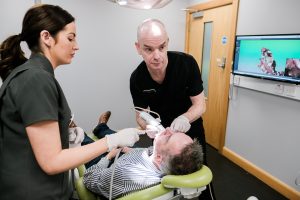Achieving a good night’s sleep
Featured Products Promotional FeaturesPosted by: Dental Design 26th September 2023

A good night’s sleep is crucial. It allows us to consolidate our memories, think clearly, remain vigilant and alert, and pay attention during the day. A lack of sleep can also affect mood, and cognition, impacting peoples’ abilities to carry out day to day activities. Some patients may experience illnesses or accidents as a result of poor sleep, and others may have underlying conditions which lead to sleep deprivation. By understanding the various factors which may impact quality of sleep, and the consequences of this, clinicians may play a crucial role in providing treatment which improves their patients’ sleep.
Recommendations for sleep
People might know of how long they should aim to sleep for, with research suggesting that the ideal zone is somewhere between 7 and 7.5 hours. However, the number of hours they actually sleep for may be different.[i]Studies show that in recent years many people are paying more attention to their sleep, with some prioritising a good night’s sleep over other activities. Despite this, experts suggest that when patients’ self-report their time spent sleeping, there are likely to be inaccuracies. This is because people tend to overestimate how much sleep they get per night, with a fairly large population sleeping less than 6 hours on average.i
This raises some concerns for professionals as, when the amount of time spent asleep drops below 7 hours, the prevalence of a number of disorders begins to increase.i With many patients leading busy lives, they may not be getting the quality of sleep they need, which is why it is important to understand the risks, and what to look out for.
The impact of a poor night’s sleep on general health
Sleep deprivation carries a number of risks – having the potential to affect attention span, mood and physical health. Research suggests that vigilant attention, reaction times, and cognitive performance begin to decline quickly once a person has been awake for more than 16 hours.i These are essential factors when undertaking tasks at work for example, or while driving. Because of this, sleep deprivation may be dangerous, having the potential to contribute to car accidents.[ii]
It is also important to consider the effects that sleep deprivation may have on patients’ health – including the potential impact on metabolism, hormone regulation, and emotional health. There are also known and suspected relationships between insufficient sleep and a number of health issues. These include, hypertension, obesity, type-2 diabetes, immune function, cardiovascular issues, mental health issues, and memory issues including dementia.i
Treating the cause
 For some people, poor sleep may be caused by medical/dental issues. In these cases, clinicians are able to have an active role in improving their patients’ sleep. Obstructive sleep apnoea, for example, is a common condition which affects an estimated 3.9 million people in the UK.[iii] The condition causes the patients’ breathing to stop and start during sleep, and must be monitored and treated as it can lead to more serious health issues.[iv]
For some people, poor sleep may be caused by medical/dental issues. In these cases, clinicians are able to have an active role in improving their patients’ sleep. Obstructive sleep apnoea, for example, is a common condition which affects an estimated 3.9 million people in the UK.[iii] The condition causes the patients’ breathing to stop and start during sleep, and must be monitored and treated as it can lead to more serious health issues.[iv]
Obstructive sleep apnoea can cause patients to have restless nights, regularly disrupting sleep. And, if left untreated, the condition can lead to issues such as high blood pressure, increased risk of stroke, type 2 diabetes, depression or low mood, and issues with concentration increasing the risk of accidents. Some patients may also find that their condition puts a strain on their relationships.iv
The condition has been linked to a number of causes, including obesity, age, family history, smoking, drinking alcohol, neck and tonsil size, sleeping position, or chronic obstructive pulmonary disease (COPD).iv Patients should be tested for sleep apnoea, and should be provided with the appropriate aid to improve their sleep. This might be a continuous positive airway pressure (CPAP) machine or a mandibular advancement device (MAD).
The Dental Sleep Medicine course from the IAS Academy provides clinicians with an opportunity to gain the skills and knowledge they need to offer this to their patients. The course is led by Dr Paul Reaney, and discusses the fundamental concepts in dental sleep medicine. This includes the consequences of sleep deprivation, interpreting sleep tests, how to implement the latest NICE guidelines on sleep disordered breathing, and providing care to those with obstructive sleep apnoea. Delegates will be introduced to MADs, and will learn how to screen and clinically assess patients to decide whether referral is appropriate, or whether treatment in the dental practice is the best option.
By assisting patients to improve their sleep, clinicians have the ability to drastically enhance their quality of life. A poor night’s sleep can affect many aspects of a patient’s life, from their ability to work and drive, to their mental and physical health. Because of this it is important to monitor and treat patients, particularly if they have a condition such as obstructive sleep apnoea, as they may require additional care.

For more information on upcoming IAS Academy training courses, please visit
www.iasortho.com or call 01932 336470 (Press 1)
Dr Paul Reaney
BDS. MFDS RCS(Eng). MFGDP(UK). DPDS. Dip PCOrth RCS(Eng). MDTFEd
Paul is a Dentist with Special Interest in Orthodontics and has successfully incorporated a Dental Sleep Medicine Clinic, Snoring SolutionsNI, within his general practice. He gained accreditation by examination to the European Academy of Dental Sleep Medicine and is currently a Committee member of the Irish Society of Dental Sleep Medicine.
[i] Worley, Susan L. “The extraordinary importance of sleep: the detrimental effects of inadequate sleep on health and public safety drive an explosion of sleep research.” Pharmacy and Therapeutics 43.12 (2018): 758.
[ii] Dinges, David F. “An overview of sleepiness and accidents.” Journal of sleep research 4 (1995): 4-14.
[iii] Sleep Apnoea Trust. HOW MANY PEOPLE IN THE UK HAVE OBSTRUCTIVE SLEEP APNOEA (OSA)? Accessed June 23. https://sleep-apnoea-trust.org/research/
[iv] NHS. Sleep Apnoea. Accessed June 23. https://www.nhs.uk/conditions/sleep-apnoea/








